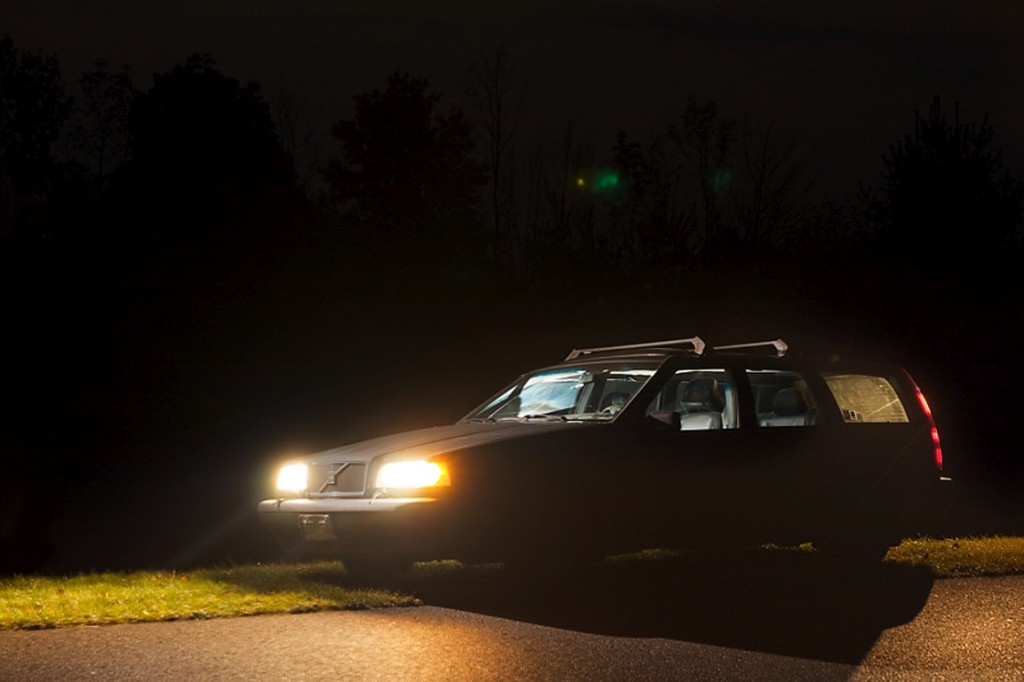 Nathan Medema is a member of local bands if then do and Kingdom Shore.
Nathan Medema is a member of local bands if then do and Kingdom Shore.
Last Friday I scurried along the cold, damp Ottawa streets to Arts Court, to catch the first departure of Tim Hecker’s Nite Ride presentation. Commissioned by artengine, Tim Hecker re-mixed previously released music from his back catalogue into 5.1 surround sound, to be played by speakers installed in a rented mini-bus as it drove around the Outaouais.
I crowded into the cozy bus with two dozen (or so) passengers. I’d been under the impression that the route was through the city of Ottawa proper, but was quickly proven wrong as we crossed the provincial border into Hull and drove for some time. Turning into Gatineau Park (the only landmark I’d be able to identify during our trip), Hecker started the playback. For the next 40 odd minutes his music became the soundtrack as the bus wove its way slowly through night time greenspace, briefly traveled along near empty highways, and skirted the edges of desolate suburbs. Hecker choose pieces for this work that he’d composed in Ottawa– living, as he did, between this city and Montreal in the early 2000s before settling down permanently on the Quebec side. This connection gave the blue, distant character of the pieces added resonance, consistent with the space and time one can find for oneself in the 613/819.
The rain that Friday had soaked the landscape, and it glistened under the passing light of lampposts and cars, synaesthetic with the music. Devoid of lyrical content, Tim Hecker’s soundscapes are ambient in a way that feels geographical, with a constantly shifting topology of dynamics and textures akin to the scraggy Canadian Shield or the grinding of tectonic plates. There’s a characteristic vastness to Hecker’s aesthetic that feels rugged and, perhaps, “Canadian”, or at least enamoured of empty spaces. This is tendency is most explicit in the Seurat-like landscape on the cover of his latest release, “An Imaginary Country“. Photographs taken by Hecker himself adorn much of his back catalogue, depecting actual places, though omitting distinguishable landmarks or addresses, and prioritizing negative space.
This referential but ambiguous referencing to a sense of place occurs in Hecker’s sound aesthetic as well, in a gritty production style that uses buried radio transmissions, static/noise, and mangled samples of piano and guitar to reference places and objects that exist in the world but that cannot be precisely located or definitively named. A sense of (empty) space and discombobulation combines with a melancholy, minor-keyed drama, which surges and withdraws, to pull the listener inward, to introspection.
The soft rocking of the bus synaesthetized Hecker’s musical landscapes with the topology and physicality of actual terrain; the sub-bass from its engine filled out out the deeper end of the frequency spectrum. The exhalations of passengers fogged the windows slightly, blurring further the glistening nighttime streets and lights, further impeding my ability to map the twists and turns of our route. I leaned back into my seat and sunk into a feeling that I’d come across in dead hour sojourns home from Montreal, after the dull thump of the club has lost its power to compel; when the exuberance and social energy of techno turns to exhausted and sated introversion.
The confines of the bus, and of the internal experience of the music, invite a kind of passivity– an invitation o become the passenger of a journey both emotional and physical through a disorienting, uncanny nightspace. Coloured by Hecker’s music, the sad neon of strip malls, the empty parking lots, and lonely headlights become greater than themselves: comments instead on a decaying, corrupted consumer society slipping into decline; on empty and vague promises of prosperity that, despite all their material proffering, does not bring respite. In this solitary space the listener is invited to feel, slow down, and spend time w/ music– to literally sit and actively listen. I find this type of invitation all too rare in a world where music is mostly experienced on the go, music-as-filler serves as pervasive background to the banality of everyday life, and where music is often actively and truly listened to in stolen moments as atomized fragments that we squeeze into ever frantic lifestyles. One can’t dispose of experience as easily as deleting an MP3 (not yet, anyway). Artengine and Tim Hecker marry, with a perverse but welcome literality, an aesthetic journey that has long been the purview of the rock auteur’s “album” or the worshipped DJ mix with a very physical version thereof.